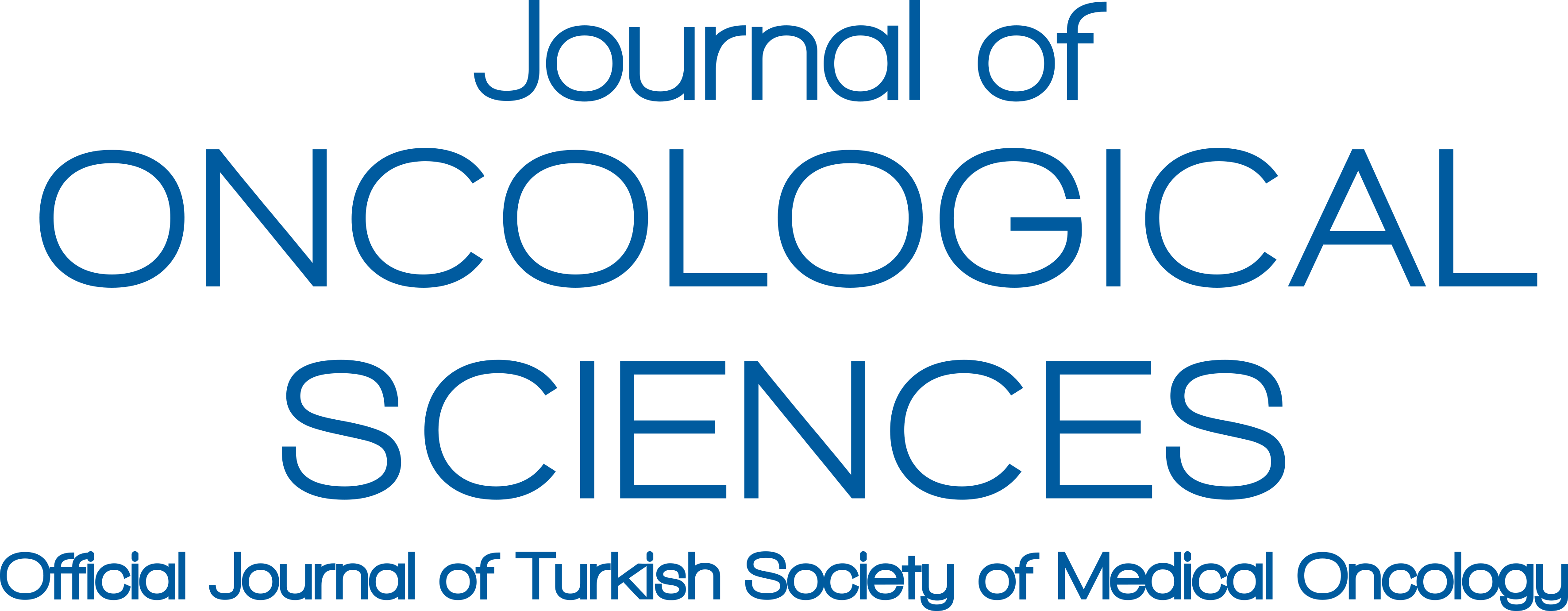Abstract
Objective: Sorafenib is the first targeted therapy for patients with advanced hepatocellular carcinoma (HCC). This multicenter
study primarily aimed to assess real-life experiences of sorafenib in patients with advanced HCC in Türkiye and to determine the prognostic
factors. Material and Methods: Patients treated with sorafenib for HCC treatment were included in a retrospective collection of
demographic, clinical, and laboratory data. Overall survival (OS) and progression-free survival (PFS), safety data, and prognostic factors
were analyzed. Results: A total of 147 patients receiving sorafenib from six tertiary oncology centers were included. Approximately 88.4%
and 11.6% of patients were Child-Pugh (CP) classes A and B, respectively. The median PFS was 5.1 (95% CI, 4.3 to 5.9) and 2.9 months (95%
CI, 2.3 to 3.5), and OS was 9.8 (95% CI, 6.4 to 13.2) and 5.3 months (95% CI, 4.1 to 6.5) in patients with CP-A and CP-B, respectively. There
was a difference in OS between CP-A and B (p=<0.001). The most common adverse event was diarrhea (19.7%, Grade 1-2; 6.8%, Grade 3).
The eastern cooperative oncology group (ECOG) performance score, CP score, neutrophil-lymphocyte ratio (NLR), and alpha-fetoprotein
(AFP) values were found to be independent prognostic factors. Conclusion: OS and PFS were similar in routine clinical practice compared
to Phase III pivotal SHARP and Asia-Pacific trials. The median survival was longer in those with a better ECOG performance score, CP-A,
and lower NLR and AFP levels.
Keywords:
Hepatocellular carcinoma, prognostic factors, sorafenib, real-life experience
References
1Llovet JM, Ricci S, Mazzaferro V, et al; SHARP Investigators Study Group. Sorafenib in advanced hepatocellular carcinoma. N Engl J Med. 2008;359(4):378-390.
2Cheng AL, Kang YK, Chen Z, et al. Efficacy and safety of sorafenib in patients in the Asia-Pacific region with advanced hepatocellular carcinoma: a phase III randomised, double-blind, placebo-controlled trial. Lancet Oncol. 2009;10(1):25-34.
3Bruix J, Qin S, Merle P, et al; RESORCE Investigators. Regorafenib for patients with hepatocellular carcinoma who progressed on sorafenib treatment (RESORCE): a randomised, double-blind, placebo-controlled, phase 3 trial. Lancet. 2017;389(10064):56-66. Erratum in: Lancet. 2017;389(10064):36.
4Kudo M, Finn RS, Qin S, et al. Lenvatinib versus sorafenib in first-line treatment of patients with unresectable hepatocellular carcinoma: a randomised phase 3 non-inferiority trial. Lancet. 2018;391(10126):1163-1173.
5Finn RS, Qin S, Ikeda M, et al; IMbrave150 Investigators. Atezolizumab plus bevacizumab in unresectable hepatocellular carcinoma. N Engl J Med. 2020;382(20):1894-1905.
6Herbst DA, Reddy KR. Risk factors for hepatocellular carcinoma. Clin Liver Dis (Hoboken). 2013;1(6):180-182.
7Zhang H, Zhang W, Jiang L, Chen Y. Recent advances in systemic therapy for hepatocellular carcinoma. Biomark Res. 2022;10(1):3.
8Lee SH, Song IH, Noh R, et al. Clinical outcomes of patients with advanced hepatocellular carcinoma treated with sorafenib: a retrospective study of routine clinical practice in multi-institutions. BMC Cancer. 2015 Apr;15:236.
9Huang CC, Chen HY, Chang RH, et al. A real-life experience of sorafenib treatment for patients with advanced hepatocellular carcinoma: a retrospective analysis at Cathay General Hospital, 2007-2015. Drug Des Devel Ther. 2019 Jan;13:397-404.
10Lee S, Kim BK, Kim SU, et al. Clinical outcomes and prognostic factors of patients with advanced hepatocellular carcinoma treated with sorafenib as first-line therapy: a Korean multicenter study. J Gastroenterol Hepatol. 2014;29(7):1463-1469.
11Bruix J, Cheng AL, Meinhardt G, Nakajima K, De Sanctis Y, Llovet J. Prognostic factors and predictors of sorafenib benefit in patients with hepatocellular carcinoma: analysis of two phase III studies. J Hepatol. 2017;67(5):999-1008. Erratum in: J Hepatol. 2018;69(4):990-991.
12Brunetti O, Gnoni A, Licchetta A, et al. Predictive and prognostic factors in HCC patients treated with sorafenib. Medicina (Kaunas). 2019;55(10):707.
13Tak KY, Nam HC, Choi JY, et al. Effectiveness of sorafenib dose modifications on treatment outcome of hepatocellular carcinoma: analysis in real-life settings. Int J Cancer. 2020;147(7):1970-1978.
14Longo L, de Freitas LBR, Santos D, Grivicich I, Álvares-da-Silva MR. Sorafenib for advanced hepatocellular carcinoma: a real-life experience. Dig Dis. 2018;36(5):377-384.
15Berk V, Kaplan MA, Tonyali O, et al. Efficiency and side effects of sorafenib therapy for advanced hepatocellular carcinoma: a retrospective study by the anatolian society of medical oncology. Asian Pac J Cancer Prev. 2013;14(12):7367-7369.
16Lué A, Serrano MT, Bustamante FJ, et al. Neutrophil-to-lymphocyte ratio predicts survival in European patients with hepatocellular carcinoma administered sorafenib. Oncotarget. 2017;8(61):103077-103086.
17Marrero JA, Kudo M, Venook AP, et al. Observational registry of sorafenib use in clinical practice across Child-Pugh subgroups: The GIDEON study. J Hepatol. 2016;65(6):1140-1147.
18Templeton AJ, McNamara MG, Šeruga B, et al. Prognostic role of neutrophil-to-lymphocyte ratio in solid tumors: a systematic review and meta-analysis. J Natl Cancer Inst. 2014;106(6):dju124.
19Dolan RD, Laird BJA, Horgan PG, McMillan DC. The prognostic value of the systemic inflammatory response in randomised clinical trials in cancer: a systematic review. Crit Rev Oncol Hematol. 2018 Dec;132:130-137.
20Longo V, Gnoni A, Casadei Gardini A, et al. Immunotherapeutic approaches for hepatocellular carcinoma. Oncotarget. 2017;8(20):33897-33910.
21Personeni N, Giordano L, Abbadessa G, et al. Prognostic value of the neutrophil-to-lymphocyte ratio in the ARQ 197-215 second-line study for advanced hepatocellular carcinoma. Oncotarget. 2017;8(9):14408-14415.
22Cho JY, Paik YH, Lim HY, et al. Clinical parameters predictive of outcomes in sorafenib-treated patients with advanced hepatocellular carcinoma. Liver Int. 2013;33(6):950-957.



